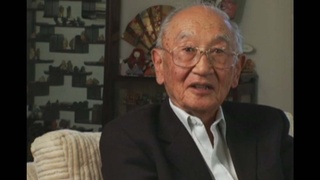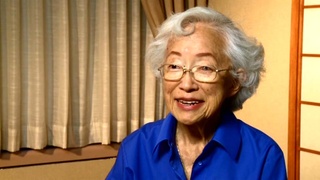Interviews
Reflecting on Japanese Americans' response to incarceration
I think they should have thought of things more. They shouldn't have felt guilty of being a Japanese. They should be proud that they're Japanese and express their feeling, and objected. If they had objected right in the beginning, maybe things like this may not have happened. Maybe something worse might have happened. Who knows? But, the first thing was, let's be obedient and find out what they're going to do to us because they said they're gonna take care of us. And we didn't know to what extent. But as it turned out, it was more like an internee in a concentration camp and when that comes about, you start thinking. And I thought that a lot of the people thought the way I did that this is not right, they're not treating me right so I'm going to rebel. And as I said, it surprised me that a lot of the people didn't think that way. 'Cause I don't feel guilty of what I did. I don't feel guilty that I'm, because I'm a Japanese. I'm an American citizen, born and raised, and you can't take that away from me as a citizenship.
Date: July 25, 1997
Location: Washington, US
Interviewer: Larry Hashima, Stephen Fugita
Contributed by: Denshō: The Japanese American Legacy Project.
Explore More Videos

Finding out Roosevelt wanted Japan to attack
(1919-2020) Member of the 1800th Engineering Battalion. Promoted Japan-U.S. trade while working for Honda's export division.

Parents expected to be taken by the FBI
(1919-2020) Member of the 1800th Engineering Battalion. Promoted Japan-U.S. trade while working for Honda's export division.

525 Quartermaster Corps
(1919-2020) Member of the 1800th Engineering Battalion. Promoted Japan-U.S. trade while working for Honda's export division.

Fort McClellan soldiers
(1919-2020) Member of the 1800th Engineering Battalion. Promoted Japan-U.S. trade while working for Honda's export division.


Discrimination for Nisei doctors
(1928–2016) Daughter of an Issei doctor

Going to camp with the Terminal Island people
(1927-2010) Political Activist


Interned at age fifteen, I saw camp as an adventure
(1927-2010) Political Activist





Incarceration, Deportation, and Lawyers
(1938-2020) Japanese American attorney and civil rights activist

